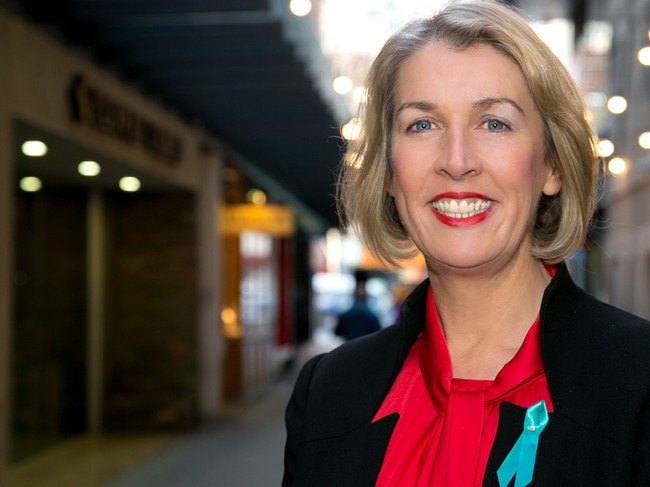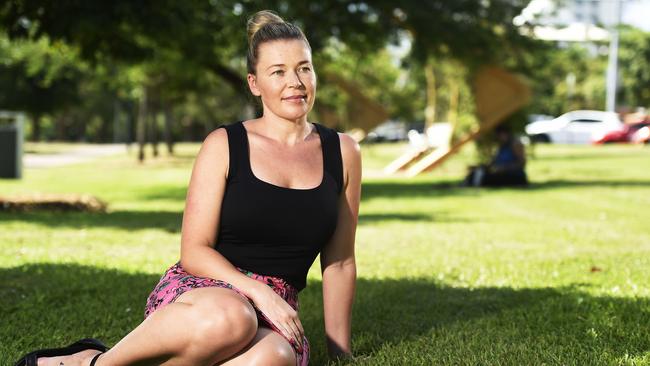Ovarian cancer affects every woman differently, meaning finding a one-size-fits-all cure is impossible. It’s a disease killing more than 50 per cent of sufferers, but in the Territory, women have to wait for a specialist to fly in or head south themselves. RAPHAELLA SAROUKOS reports
She had a history of cysts and endometriosis and was told to keep an eye on it. Six months later she returned to the doctor after presenting odd symptoms.
The cyst had grown from 4cm to 8cm and a second cyst had appeared.
By the time she went into theatre in September, the first cyst measured 12cm. They were removed and diagnosed as borderline mucinous tumours.
Ms Harris was referred to a gynaecological oncologist because of their rapid growth and under the specialist’s orders, her right ovary and appendix were removed in December and sent for testing.
After a long wait, this January she was diagnosed with ovarian cancer.
The diagnosis took a toll on Ms Harris, who was hospitalised for three days after having a breakdown.
“I was trying to suppress everything but I think there was a grieving part of it,” she says.
“You’ve got to try stay positive and on top of it.”
Ovarian cancer is known as a “silent killer” because its difficult to detect during early stages and there are no definitive tests.
An inkling saved Ms Harris’ life. She now urges other women, young and old, not to disregard symptoms and be persistent with doctors.
“Women tend to ignore the symptoms and I did ignore them for about four or five months,” she said.
“I felt something wasn’t right, my intuition told me and I’m not the type of person to say ‘oh my god something’s wrong need to go to the doctor’.
“The symptoms of ovarian cancer are really common. Mine felt like going to the toilet a lot. You can shrug that off as ‘maybe I drank too much water today’.”
Ms Harris praises the efforts of Royal Darwin Hospital for helping diagnose the disease but says the lack of local specialists makes the process stressful.
“The hospital has been amazing,” she said.
“They’ve referred me to psychologists, got me physio appointments to help. They’ve been really good but the only downfall is we don’t have specialists.”
Since the early 1990s, gynaecological oncologists have provided fly-in fly-out services at the Royal Darwin Hospital.

Ms Harris sees Professor Alexander Crandon who, along with other doctors from Mater Hospital in Brisbane, has been visiting Darwin three times a month since 2009.
Prof Crandon is the director of the Queensland Centre for Gynaecological Cancer and is arguably one of the best in the Australian field for gynaecological oncology.
Ms Harris values the specialist’s expertise but says its difficult not having a permanent specialist in the NT.
“He’s absolutely brilliant, probably the best person they could have here,” she said.
“But I think in terms of specialists, we need to have some more here.
“It’s just made it really difficult because you can’t develop that relationship with the person who’s doing your surgery and giving you advice that’s going to change your life.”
However, according to a spokesperson from Top End Health Services, the FIFO gynaecological oncologists are currently meeting the demand for Territory cases.
Women with complex cases, outside the capabilities of Territory services, are flown interstate for treatment.
This is, at the moment, averaging out to about six women a year.
Health Minister Natasha Fyles says the specialists’ visits are sufficient for the NT.
“All Territorians are entitled to access to high quality health services,” Ms Fyles said.
“The monthly visiting specialist gynaecological oncologist service is supported by the RDH gynaecology team to provide a high quality continuity of care service to meet the current demands within national waiting time standards.”
She is supported by Australian Medical Association NT president Rob Parker, who says the lack of specialists is a financial matter.
“It’s an economic thing. You don’t want to employ doctors who don’t have any work to do,” he says.
“Unfortunately with certain small areas we just don’t have the budget to sustain. We have to be very careful spending money.”
There are local and national authorities who disagree however.
Shadow health minister Lia Finocchiaro advocates for first-rate health care in the NT.
“All Territorians deserve access to world class healthcare,” she said.
“The CLP Opposition recognises that our small population and vast distances make delivery of health services a challenge, but that is no excuse and the Government must do everything it can to secure the best health professionals to deliver services in the Territory.”
According to the Australian Institute of Health and Welfare, 6170 cases of gynaecological cancers were diagnosed in Australia in 2018.
Of these cases, 1613 cases were ovarian cancer.
Ovarian cancer is a complex disease — it is not one type of cancer but a collection of different diseases with varying molecular structures and trajectories.

Ovarian Cancer Australia (OCA) chief executive Jane Hill describes the disease as the “forgotten cancer”.
“We look at what has happened at breast and prostate cancer and it really inspires us because their survival rates are 90 per cent,” she says.
“Ovarian cancer languishes at 46 per cent. About 1000 women die a year.
“Treatments have not changed much for 50 years and the treatment is quite brutal.
“This is a cancer that keeps coming back, that’s what’s mind-bendingly cruel about this disease. Women have to cope with that fear ‘is my cancer coming back?’”
Ms Hill is shocked the NT doesn’t have a permanent gynaecological oncologist.
“We know that around the country up to 10 per cent of women have complex ovarian cancer surgeries and they’re not performed by a gynocological oncologist for one reason or another,” she says.
“It might be emergency presentation but women need to be in the position to make an informed choice about the surgeon they have to undertake it.”
She says the rarity of ovarian cancer and lack of specialists in places such as Darwin is why OCA is determined to provide women with resources.
“OCA is here to connect all the women, no matter where they live, and give them as much information,” she says.
“We have to find ways of connecting women throughout the country, especially ones in country areas where accessing services is difficult.
“There’s too many women that we lose to this cancer and that’s mothers, daughters, wives and partners. In our work, we provide care and support to the women and we hear the tales, their stories and there’s just too many women and the families that are so greatly impacted. It turns their lives upside down.”
Ms Hill says despite the lack of effective treatments, considerable research is being done to find solutions.
“We’re entering a new phase and we hope with more research, this one size fits all treatment regime will be no longer. There’ll be personalised medicine,” she says.
Darwin may be lacking but there is no shortage in support.
Cancer Council NT support nurse Lisa Dann says women with ovarian cancer and people with all types of the disease are welcome to use their services.
“We can be there as little or as much as people need,” she said.
“Some people think they need to do it on their own but they don’t. We provide support services for people whether it be nurse counselling or supporting people through their journey or with their family.”
February is Ovarian Cancer Awareness Month.
Ms Harris has persevered through the heartache and stress of the diagnosis and spent the month sharing her story and knowledge with others.
In March, Ms Harris will undergo a full hysterectomy. She recently began IVF preparation to extract eggs from her remaining ovary.
“A lot of women don’t realise the symptoms of ovarian cancer, they’re just common symptoms,” she said.
“If you have any weird symptoms, going toilet a lot, getting bloated really quickly, being tired all the time and feeling full quickly, don’t ignore them.
“Be persistent, go to the doctors and tell them what you want.”
She and Ms Hill urge women to stop neglecting their health.
“Women are so busy. We’re mothers and we work, we’re wives and partners, we have so many commitments and often we wont put ourselves first,” Ms Hill said.
“I say to all women if you aren’t feeling well, you are the one who best knows your body and you need to get yourself off to the doctor.”

Add your comment to this story
To join the conversation, please log in. Don't have an account? Register
Join the conversation, you are commenting as Logout
Sonny’s search: What’s bringing this SANFL legend to Alice Springs
For more than 50 years, a SANFL legend – and stolen generation survivor – has been returning to Alice Springs on a deeply personal search. Now, he’s had a breakthrough.
‘It’s a coup’: ‘Terminated’ Alice Springs principal’s explosive allegations
The former principal of troubled Alice Springs school is alleging he was sacked after standing his ground over a proposal which is going to be ‘a sh-t show’.